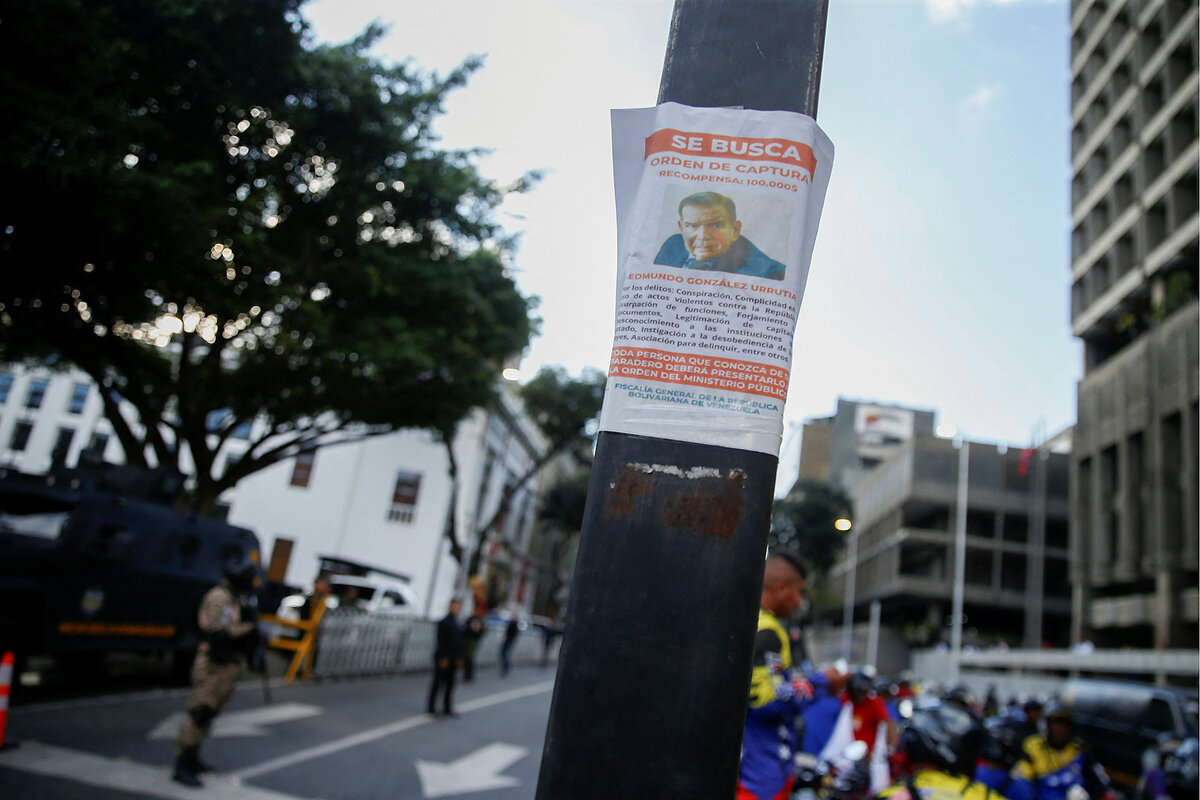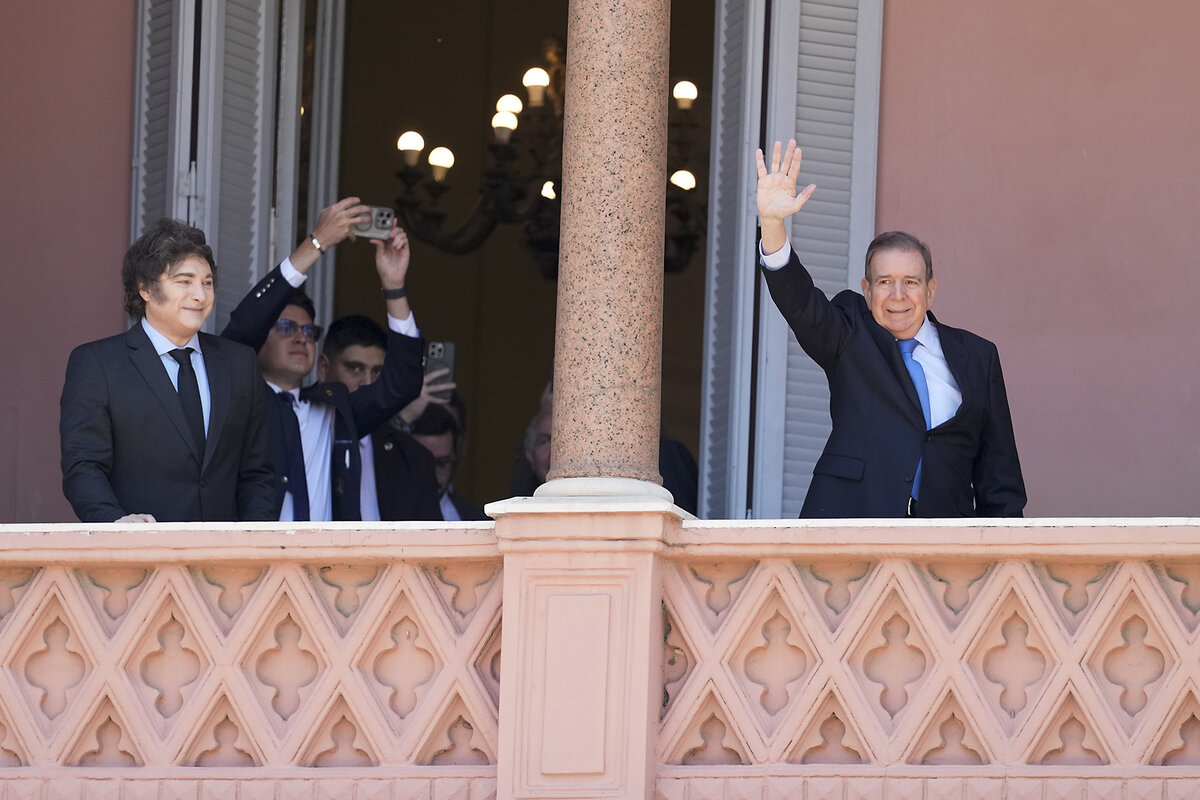Key question as Venezuela prepares for inauguration: Who is the next president?
Loading...
| BOGOTÁ, Colombia
The Venezuelan government is preparing to inaugurate President Nicolás Maduro for his third term in office Friday. But the political opposition, whose candidate many governments and observers believe legitimately won the election, has other plans: to inaugurate Edmundo González.
On Thursday, opposition supporters are taking to the streets across Venezuela – and in cities worldwide – to call for Mr. Maduro’s recognition that he lost the July 28 vote. Meanwhile, the government has put a bounty on Mr. González, who has been exiled in Spain since last summer. It has mobilized the military across the capital, Caracas. And it’s publishing names of opposition sympathizers as a form of intimidation and telling the public that Mr. Maduro’s inauguration will be a day of “peace [and] tranquility.”
Why We Wrote This
According to independent observers, Venezuelans elected Edmundo González president last summer, despite incumbent Nicolás Maduro’s claims of victory. Questions are swirling over who will take the oath of office Jan. 10.
Mr. Maduro may have miscalculated his chances of winning in July, following his barring popular candidates, intimidating voters, and making it difficult for Venezuelans abroad to cast their ballots.
In last summer’s vote, the opposition gathered and published evidence of its victory by collecting over 80% of the machine-printed tally sheets that reflect the electronic vote.
“Repression is the only tool they [the government] have left,” says Samuel Díaz Pulgar, a Caracas-based member of the opposition’s campaign team.
Editor's note: Since publication, opposition allies say prominent leader María Corina Machado was arrested by government officials in Caracas before her release late Thursday afternoon, Jan. 9.
In black and white and in color; printed on sheafs of paper and staring down from television screens in public spaces – the face of Edmundo González, the opposition candidate in Venezuela’s hotly contested presidential election last summer is plastered across Venezuela this month. He has become one of Venezuela’s “most wanted” ahead of tomorrow’s presidential inauguration, carrying a $100,000 bounty on his head.
The government is preparing to swear in President Nicolás Maduro for his third term in office Friday. His self-proclaimed victory following the July 28, 2024, election has been condemned as fraudulent by independent observers and dozens of countries worldwide, including the United States.
Why We Wrote This
According to independent observers, Venezuelans elected Edmundo González president last summer, despite incumbent Nicolás Maduro’s claims of victory. Questions are swirling over who will take the oath of office Jan. 10.
Ahead of the inauguration ceremony, the military has shut down streets and deployed soldiers and armored vehicles across downtown Caracas. Military presence is set to be larger than in any other Venezuelan presidential inauguration ceremony over the past two decades to “guarantee peace,” according to the government.
But the armed services are also on the hunt for Mr. González, who the opposition coalition says is coming back to Venezuela after months of exile in Spain to claim the post he allegedly won with 67% of the votes, according to tally sheets published by the opposition.
In recent weeks, both Venezuela’s government and opposition have upped their efforts to lay claim to the presidency. The government has ramped up citizen repression through a new wave of arbitrary arrests. The opposition has called for mass protests in and outside the country, and dispatched Mr. González on a diplomatic tour throughout the Americas. Who will lead Venezuela over the next six years remains shrouded in uncertainty, but the answer could shape issues ranging from international diplomatic cooperation to the economy to migration.
“Only tool they have left”
Days before the inauguration, hooded men dressed in black kidnapped Mr. González’s son-in-law in front of his children. Meanwhile local news reported the government set up military check points and deployed drones near the home of the 84-year-old mother of María Corina Machado, the wildly popular opposition leader who appointed Mr. González as her replacement after being barred from running for president herself.
Diosdado Cabello, minister of interior and a staunch Maduro ally, has threatened to arrest Mr. González – or even shoot down his plane – should he return to Venezuela.
Mr. Cabello has assured citizens that at tomorrow’s inauguration “it will be peace, tranquility.”
Since the July elections, Venezuela has seen a surge in arbitrary arrests and political repression, says Gonzalo Himiob Santomé, vice president of Foro Penal, a Venezuelan human rights organization. His nongovernmental organization has tallied about 1,800 political prisoners currently being held, many charged with terrorism or incitement of hatred. The number of politically motivated incarcerations jumped by roughly 500% since before the election, he says.
In the days leading up to the inauguration, international pressure on the government has mounted. On Tuesday, the Inter-American Commission of Human Rights released a report calling attention to Mr. Maduro’s use of state terrorism and coordinated repression to maintain power. Yesterday, the documentary “From Macedonia with Love” was released, documenting both the popular uprising and government repression following the July vote. The documentary’s website was blocked inside Venezuela soon after its release.
The government’s use of the military and fear tactics – including publishing a list of opposition targets this week – is a “paradox,” says Mr. Himiob. “Instead of showing strength, it reveals” the government’s weakness.
“Repression is the only tool they have left,” says Samuel Díaz Pulgar, a Caracas-based member of the opposition’s campaign team, whose name was included on the list of government targets.
The opposition has upped its pressure on Maduro’s government, too. As a former diplomat, Mr. González is tapping into his professional roots by orchestrating an international tour for support. He started in Buenos Aires, holding hands with Argentine president Javier Milei on the balcony of the Casa Rosada while waving to thousands of exiled Venezuelans chanting: “We are not afraid.”
He then met with President Joe Biden at the White House and other regional leaders, as well as with a handful of former Latin American presidents who say they will accompany him in his attempt to claim the presidency.
At home, the opposition is planning to confront Mr. Maduro before he can take the presidential oath. Ms. Machado called for mass protests for Jan. 9 to “reclaim” the opposition’s victory. Demonstrations are expected to take place across the globe, from Cairo to Brisbane and Tokyo to New Orleans.
Déjà vu or something new?
The governing party has been in office since 1999 when Hugo Chávez, Mr. Maduro’s predecessor, took office as the democratically elected president. But in recent years, Mr. Maduro’s government has become increasingly authoritarian, says Paola Bautista de Alemán, a Venezuelan political scientist.
Venezuela’s electronic voting system is one of the most transparent and democratic in the world, says Dorothy Kronick, a professor at the University of California at Berkeley and co-author of the paper “How Maduro Stole Venezuela’s Vote,” published this month in the Journal of Democracy. “What is so amazing about this system is that you don’t have to trust anyone, people themselves can check and validate results,” Dr. Kronick says.
The electronic voting system was initially set up by Mr. Chávez to prove that he was not cheating when he was winning elections by landslides in the 2000s. Now it shows undisputedly that Mr. González won, Dr. Kronick says.
Mr. Maduro, who is far less popular than his predecessor, may have miscalculated his chances of winning in July, following his barring of popular candidates, intimidating voters, and making it difficult for Venezuelans abroad to cast their ballots.
In last summer’s vote the opposition gathered and published evidence of their victory by collecting over 80% of the machine-printed tally sheets that reflect the electronic vote.
But Mr. Maduro isn’t relying on votes to stay in power; he’s relying on the military, observers say.
“The next few days depend on those with the weapons – the armed forces,” Mr. Himiob says.
Now, many are asking if the armed forces could shift alliances to allow Mr. González to take the oath of office.
“Many police officers and soldiers are sending messages and making decisions right now,” Ms. Machado said in a press conference earlier this week. “In every household, in the families of militaries and police, there are children, partners, parents, siblings inviting them to be part of” the opposition, she said.
Geopolitical factors, such as last month’s fall of Syrian President Bashar al-Assad, one of Mr. Maduro’s allies, has sparked hope in the opposition. Other Venezuelan allies like Russia and Iran are now distracted, grappling with their own problems, Ms. Machado says.
Venezuela’s inauguration ceremony is not an end date for the opposition, says Mr. Díaz Pulgar. He believes the leaders of Mexico, Brazil, and Colombia – who tried to facilitate negotiations for a peaceful leadership transition last year – will have to take a stand if Mr. Maduro gets sworn in without proof of electoral victory. However, all three governments are sending representatives to attend Mr. Maduro’s inauguration.
Before noon on Thursday, opposition supporters started gathering in cities and towns across Venezuela. It is no small feat following the mass arrests and detentions following the July vote, and at a time when citizens regularly clear their phones of pro-González text messages or photos before leaving home.
“If we as Venezuelans manage to overcome this fear [of expressing our democratic will], there will no way to repress” us, Ms. Machado said earlier this week. Venezuela’s democratic destiny, the opposition believes, is still up for grabs.









